Location
Our Seattle Location
Northpoint Seattle’s outpatient treatment program is located in beautiful Seattle, Washington, and we work to help the surrounding communities.
- Seattle
2111 N Northgate Way Suite 101,
Seattle, WA 98133, United States

Intensive outpatient treatment. Many people wonder about it. Many people ask about intensive outpatient treatment. But not many people know the answer to the question “What is IOP”? That’s unfortunate. This page is dedicated to making sure you understand everything there is to know about this innovative method of treating substance abuse and addiction.
This article covers the different aspects of Intensive Outpatient Treatment. It also compares IOP to other addiction treatment options. You’ll find out how the approach can benefit people with a dual diagnosis also. Finally, it looks at the IOP program at Northpoint Seattle.
Substance abuse and addiction are tricky issues. In equal measure, there are many different options for treatment. This can make finding the best addiction treatment option tough. Use this information to get a better understanding of the different treatment options. Then make an informed decision about the best option for yourself or someone you care about.
There are many different types of outpatient treatment programs. Some are longer. Some are shorter. Some require more involvement, and some require less involvement.
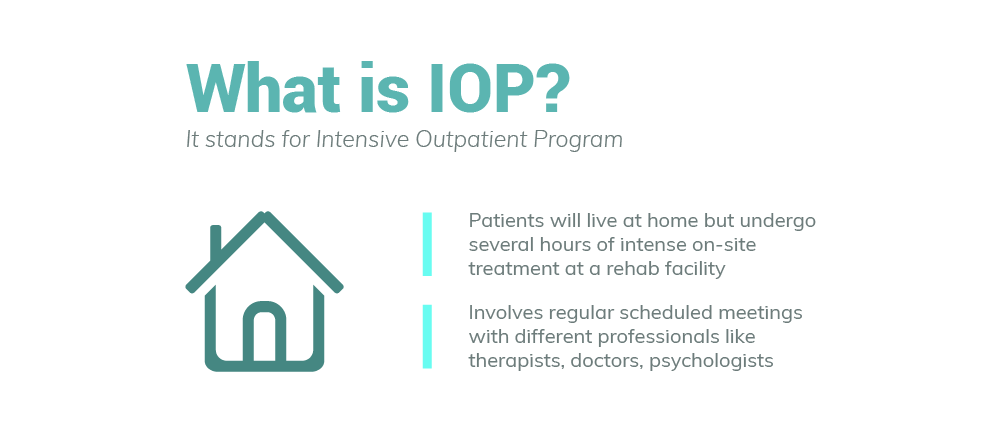
So what exactly is an Intensive Outpatient Program (IOP)? Intensive outpatient programs bridge the gap between inpatient, residential treatment, and other outpatient programs. They act as a way to get the benefits of residential treatment without the costs and logistical hurdles inpatient treatment creates. People are very busy. After all, there’s a lot to do. And, in the modern world, people are expected to be available 24/7. That means that few people can take the time to do an inpatient treatment program. They need to go to work and/or care for their family. As a result, it can be hard for people to get the help they need.
Intensive outpatient treatment has many different parts. These parts combine to form an effective treatment program. Patients can still do their daily tasks. But they spend their free time getting treatment.
If you’re suffering with drug or alcohol addiction, you’ll want to know what your options are. There are a few different types of programs to choose from. How seamless your recovery will have a lot to do with how well your addiction rehab program works for your needs.
An IOP has a lot of benefits to it, being a good mixture of high quality treatment with the freedom to continue on with your obligations in life. If you’ve been unsure about getting addiction help, this option might just change your mind. An IOP will involve going to and addiction facility 2-3 days per week for 3-5 hours. You’ll go through alcohol or drug rehab methods that are used in inpatient programs. This would include things like counseling, nutrition therapy, and group peer therapy.
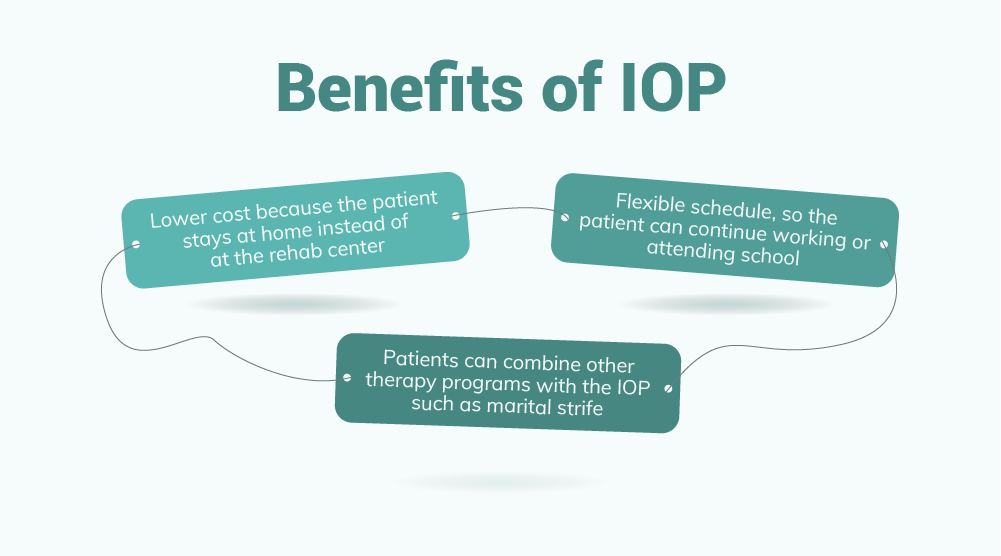
Intensive Outpatient Programs cost less money than inpatient. The program is more flexible and you can combine other therapy programs with IOP such as marriage counseling.
As you’ll be at home while going through rehab, there is a greater risk of relapse. It’s the accessibility that you have when you have the freedom. The possibility of encountering the drug or alcohol is there, that puts you at risk. You don’t have the 24/7 support as readily available as you do with inpatient programs. Medical detox may not be available within your IOP. If you’re new to recovery, IOP isn’t recommended as your first choice for rehab.
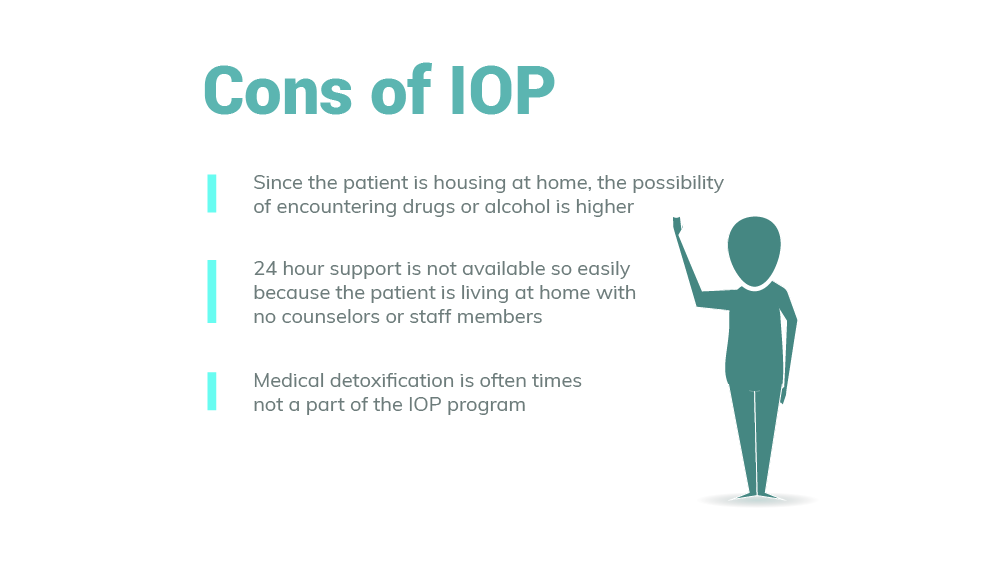
It’s best if you are medically stable first before starting an IOP. This means that you don’t require daily monitoring due to health risks or a high chance of relapse. You should be mentally stable and be able to cope with being a part of society. Attending an IOP once you’ve completed an inpatient rehab program is a good path to take if you believe you need more support.
A licensed therapist will do a full assessment on you which will help the facility create the right program just for you. This assessment also determines whether an Intensive Outpatient Program is right for you. If you’ve relapsed, have a non-supportive home environment, or are considered a danger to yourself and others, outpatient programs may not be right for you.
If you’re addicted to heroin or other opioids, it’s usually recommended that you attend an inpatient rehab program first. If you really can’t go to inpatient rehab due to time or money constraints, an outpatient treatment center will never turn you away.
You get treatment that will give you the empowerment to do right by yourself and to others around you. You get skills and tools that will help you cope with the ebb and flow of life as a recovering addict. The nice thing about an Intensive Outpatient Program is it can be worked around your schedule. You don’t have to miss work or any other obligations that are important to you. You can live at home as opposed to an inpatient residence which makes rehab cheaper for you.
You must commit to three group therapy sessions every week. There will often be a family program available too as this is very important when doing an IOP. Your home life will need to be a supportive environment as you go through rehab. You’ll also get information on 12-step programs in your area. It’s important that you attend these meetings too for the peer support.
You learn about the fundamentals of managing your addiction and strengthen the skills so you can start anew as someone sober. The staff at the outpatient facility will help you to put those fundamentals of your new, sober life into practice. They also help you with whatever problems come up during your time in the program. You get a variety of therapy that helps to heal every aspect of you.
They will help you create a plan that includes milestones so you can measure your success. This can be highly motivating. If you’re determined to live a sober lifestyle but have daily responsibilities, this is an excellent choice.
An Intensive Outpatient Programs offers you holistic and medical detox. If they don’t, they are going to have the connections to get you into a detox program. For IOP that does have medical detox, this will be done under medical supervision throughout the day. In an outpatient detox program, there will be a team of professionals that will come up with a personalized plan. This will involve your medical history and your history of substance abuse.
How long you stay in IOP will depend on you. The nature of your addiction, what you were addicted to, and for how long are some of the factors. Many of the programs are for 90 days but some can be up to 120 days. This gives you the necessary time to fully integrate all you’re learning about yourself and addiction management strategies. There are goals that a treatment center will want you to hit. You’ll have these goals set up with the help of your therapist as your enter the program. When you achieve these goals, you feel a sense of accomplishment which aids in keeping you motivated.
Goals can include:

There are many addiction treatment options. Therefore, it is helpful to compare IOP to other options. This helps explain what Intensive Outpatient Rehab is, and what it isn’t.
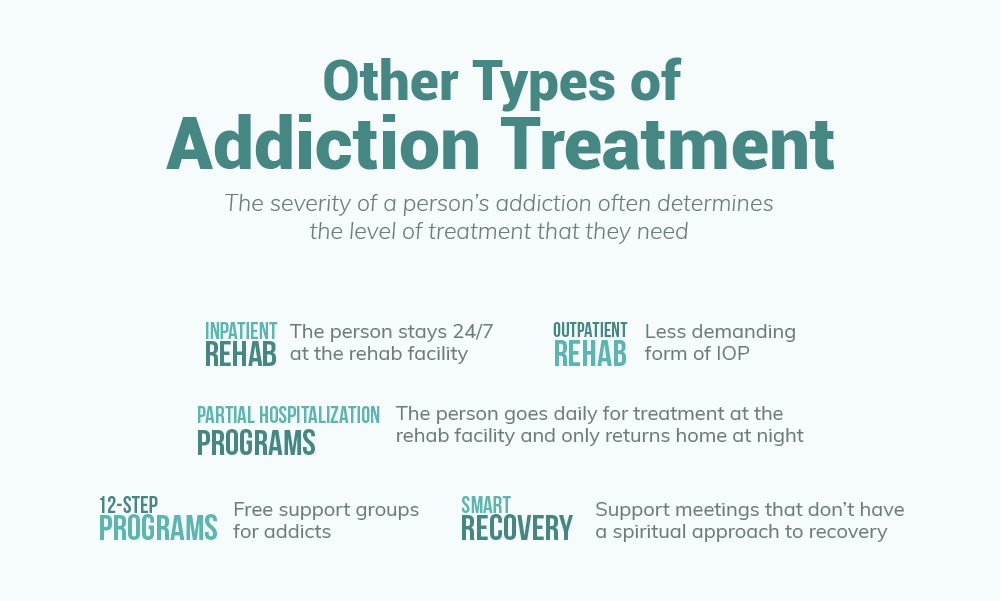
The biggest advantage in outpatient care is that it offers more flexibility than inpatient care. It allows for patients to receive treatment and therapy while living at home. Inpatient treatment is more expensive and generally requires 24/7 presence on the premises.
Inpatient treatment can still be the best option for many people. There are several factors that can help determine whether you need inpatient or outpatient care.
For example, some drugs have dangerous withdrawal effects. These include things like opiates, benzos, and alcohol. Depending on how often a person uses a substance, and how much of a substance they use, they might need a medically supervised detox.
Inpatient treatment provides access to doctors and medical staff 24/7. That means if there is a problem with the detox there will be staff on hand to help. This can help save a patient from awful injuries. It can even save someone’s life.
However, inpatient treatment isn’t for everyone. Outpatient rehab is a preferable alternative for many people, especially those with jobs and families to keep up with. Even a relatively short, personalized inpatient program can be far too much to ask for someone with a job and other daily responsibilities. After all, when is the last time you got four weeks straight off of work without any problems?
Intensive outpatient treatment helps patients save on costs. It also lets them continue to work and meet their other responsibilities. Also, intensive outpatient programs offer almost all of the same benefits as inpatient treatment. The only difference is that the patient isn’t monitored 24/7.
Inpatient treatment programs frequently lead to intensive outpatient programs. This allows people to continue getting the help they need to stay clean. It also allows them to resume their normal lives. That means that IOP is a good option to help someone stay clean when they’re done with their inpatient treatment program or a detox program.
If you’ve already done an inpatient rehab program or have a mild addiction, IOP is an excellent choice. When compared to inpatient programs, it costs less. You have more flexibility too, which allows you to maintain your lifestyle. This is important for some as they can’t take the time off to do inpatient rehab. Family is an important part of any Intensive Outpatient Program because you’ll need their support and understanding.
Family support is valuable for an addict as they start living life as a sober person. Your family will learn how to hold you accountable for whatever decisions you make. They will also be asked to ensure you attend your meetings. This is also going to bring back trust into the family dynamic. Addiction is hard on the people closest to you and there will be some effort for everyone to rebuild what may have fallen apart during your time of drug or alcohol abuse.
Outpatient treatment is the most convenient addiction treatment option. People show up for assigned treatment. This can take many forms. Sometimes it is different types of therapy. It can also include things like 12-step programs. Outpatient treatment can also take the form of different types of technologically-based medical interventions.
Convenient as it is, traditional outpatient treatment is often not the best option for recovery, as it doesn't provide sufficient support for some patients between treatment sessions. A traditional outpatient program often features only one or two treatment sessions a week. For those with really serious afflictions, once or twice a week just isn't enough treatment.
There is a demand for an effective, consistent rehab program that still allows for a mostly uninterrupted life at home, but it isn't as invasive as full inpatient treatment. For many people, the best choice is a middle ground between full-time inpatient treatment and sporadic traditional outpatient treatment.
That middle ground is IOP - intensive outpatient treatment. IOP is more involved than a traditional outpatient program, involving longer treatment sessions, more times a week. Choosing IOP still gives people the freedom they need to continue with their day-to-day activities, while also providing the consistent substance abuse treatment they need to recover and kick their addiction.
It is because of this flexibility that IOP programs are growing in popularity and effectiveness. But despite their growing popularity, they're not right for everybody. Here are some things you need to know before you decide.
There are a variety of different outpatient programs. The normal outpatient programs aren’t as intensive as an IOP. You don’t have to commit as much time to your addiction recovery when you go through an outpatient program. Usually, you’ll do one to two hours of therapy once or twice per week. Intensive Outpatient Programs will require much more from you. An outpatient program is usually considered a step-down program. If you don’t need detox and know that you already have the motivation to stay clean, this is a good program.
If you have multiple addictions or dual diagnosis disorder, you shouldn’t choose an outpatient program. These disorders are complex and require specialized treatment you won’t get with an outpatient program. Before you decide on any program, you can get an assessment to find out what level of treatment is necessary.
Partial Hospitalization Programs, or PHPs for short, are similar to intensive outpatient programs. The patient spends the day in a treatment program. But they go home in the evening. The treatment essentially takes the place of a person’s working hours.
This type of program works for some people. It is best for people that don’t work. It is also good for people who work hours other than the standard 9 to 5.
But many people can’t spend 40 hours a week in treatment. IOP allows people to get the treatment they need while still seeing to their daily responsibilities. That means they can keep working, paying bills, and caring for family members. It also cuts down on the cost of treatment.
It is also recommended as a post-inpatient rehab program. The difference between PHP and IOP is the amount of treatments you get every week. The PHP usually requires you to do 6 hours of treatment per day, 5 days a week. This makes it challenging to work a full day or meet your obligations. It is a resource for those who have relapsed and the addiction is out of remission. IOP requires half the time commitment.
12-step programs are a popular addiction treatment method. They have several advantages. A 12-step program provides the patient with a support group. It lets them learn from the stories of others. It also lets them relate to other people’s stories. This helps a person understand that they’re not alone in their struggle.
But there are limits to 12-step programs. Most 12-step programs are voluntary. There’s no attendance record, because they are anonymous. That means it is easier for a person to skip 12-step program meetings. There are other drawbacks as well. A 12-step program needs enough people to create a stable group. That is a challenge in some areas.
IOP incorporates 12-step programs as part of the intensive outpatient experience. One of the key differences is that IOP uses other methods as well as 12-step programs for recovery.
This means that intensive outpatient treatment can provide all of the benefits of a 12-step program, plus more. That’s because IOP also offers other services. These include things like group counseling and therapy. It also includes individual therapy. This can help patients get comfortable with treatment. As a result, their time in 12-step programs is more productive.
SMART Recovery is an addiction recovery support program. The organization has meetings all over the country. They also have meetings online. The program works in a similar way to 12-step programs. The main difference is that it doesn’t use the 12-step framework.
Instead, SMART recovery programs focus on self-empowerment to help people break their addiction. They also adjust their procedures according to the latest scientific evidence. This sets them apart from other mutual-support programs which rely on a standard method, like 12-step programs.
But SMART Recovery doesn’t offer all of the same resources as IOP. It doesn’t give people access to individual therapy. It also doesn’t provide medication support to help people get clean. Finally, SMART Recovery has many of the same drawbacks as 12-step programs. Specifically, there may not be a SMART recovery group in your area. Also, the group’s meeting times might not work with a patient’s schedule.
Intensive outpatient treatment incorporates all of the best aspects of the SMART recovery program. Our IOP program is based on the best evidence-based practices according to scientific studies. Group meetings and support groups are part of any high-quality outpatient program.
Dual diagnosis is a complex disorder. It is addiction coupled with a mental disorder. This makes recovery more challenging. Only a dual diagnosis specialist should work with an addict who has this disorder. There are programs just for people who have dual diagnosis and they are usually an inpatient rehab program. However, they will usually need more care once rehab has been completed which is where IOP comes in. It’s an excellent way to solidify the sober lifestyle with further treatment and family integration.
One of the biggest benefits of IOP is the way that it helps people with a dual diagnosis. Also called co-occurring disorder, this situation is very common among addicts. It means that a person has one or more mental health issues in addition to substance abuse disorder.
These cases are tricky to deal with. An underlying mental health issue can increase the odds of a relapse. It can also make it harder to get clean in the first place.
Most other treatment options don’t focus on helping people with a dual diagnosis. After all, a 12-step program like AA has a singular focus. The members are there to talk about their relationship to alcohol. Also, mental health disorders require a trained medical professional. Groups like AA or NA aren’t as well equipped to deal with something like depression and addiction together.
However, trained medical professionals know the best ways to treat a co-occurring disorder. They use the latest scientific evidence to come up with ways to help people treat all of their issues.
There are several things that need to be considered to determine if IOP is the best option for a particular person. These factors focus on the likelihood of success. They also take into account other medical needs.
Intensive Outpatient Programs are an important means of recovery. Every addiction is unique and it’s important to get assessed to find out if IOP is right for you. Usually, you should enter into an inpatient rehab first. If you feel you still need more support, IOP is an excellent way to get that. The family integration is also really important and a means of bringing your loved ones close to you again. The most important thing is you get the help you need so you can put addiction in the past.
Inpatient Treatment is best if you…
Inpatient treatment options are better for some people. This is especially true for the following factors.
Intensive Outpatient is best if you…
Intensive outpatient treatment is a better option for lots of patients. There are a few factors that favor outpatient treatment over inpatient programs. These factors include:
There is a lot of confusion regarding detox and rehab. Many people think that they are the same thing. But that is not the case. Detox, or detoxification, is the process of the body removing drugs already in the system. It lasts until the body is more accustomed to not having drugs than having drugs.
Rehab is the process of taking proactive steps to understand and fight an addiction. A person can do a detox program and never engage in rehabilitation. This places them at a higher risk for relapse.
Also, relapse after a detox program is more dangerous. That is because people tend to go back to using the same amount of drugs they did before detox. But their body loses some of the built-up tolerance to a drug during detox. That means they’re more likely to overdose.
This also shows why it is important to engage in a rehab program in addition to detox. Rehab programs like IOP help a person resist the urge to use again. They offer methods and tricks to prevent relapse.
Everyone is different. That means there isn’t one addiction treatment solution that works for everyone. Some people respond well to IOP. Others need inpatient treatment.
Also, every addiction treatment center is different. Any addiction treatment center that claims to be the best option for everyone shouldn’t be trusted. There’s a series of questions a person should ask when looking into addiction treatment options. The government has a helpful guide to finding the right addiction treatment program.
Patients should use this guide for inspiration to decide which options are right for them. This increases the odds that they will have a successful recovery. For example, a person that’s terrified of horses won’t benefit from equine therapy.
It’s important to do research on the different addiction treatment options available. This includes looking at sites like the Better Business Bureau. It also includes looking at reviews at places like Yelp and Google.
One thing to keep in mind is that not every review is trustworthy. There are sites that specialize in making marketing and promotional materials look like reviews. That is why it is important to check lots of different sources when considering addiction treatment options.

As an IOP patient at Northpoint Seattle Bellevue, you get the same high quality of care as you would expect from an inpatient program. You just get it in a way that fits your timetable and schedule. Most treatment sessions will be scheduled in the evenings, meaning you can continue to work during the day, and spend time with your family and friends.
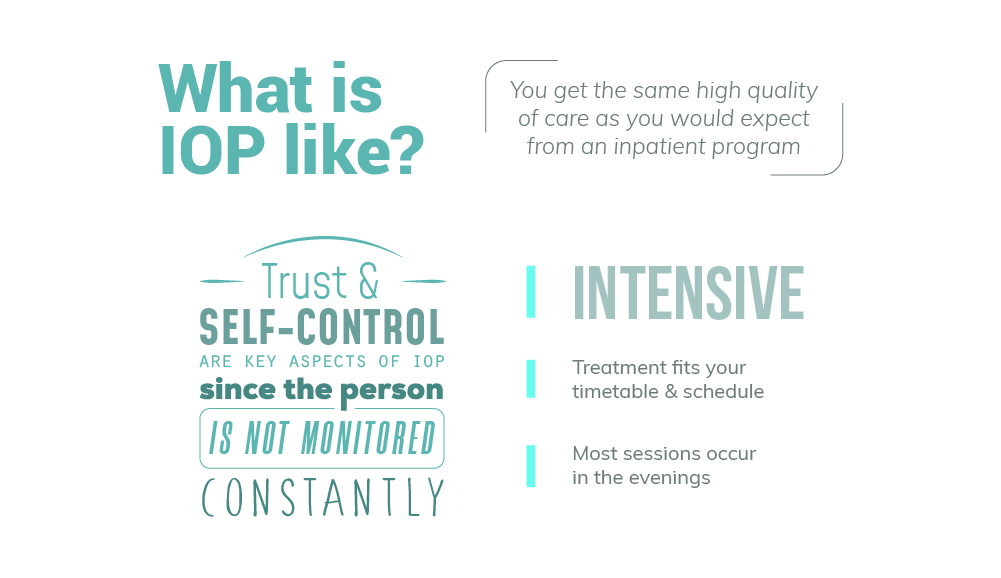
But there is a certain level of trust and self-control required to make an IOP program work. One of the reasons inpatient treatment is effective is because the facility is free of drugs and alcohol, which means patients are forcibly removed from addiction.
That won't be the case with Northpoint Seattle's IOP program. You have to be at least as committed to your recovery as we are, or you'll simply leave your treatment session and hit the bottle or needle just as soon as you get home. That's what we don't want.
It's a double-edged sword. Enrolling in an IOP facility means you don't have to be there 24/7. You will still get thorough care and treatment to overcome your addiction, but you can otherwise continue your home life unencumbered.
Part of the benefit of an inpatient treatment facility is the comfort of being in the care of highly-trained professionals at all times. Overcoming addiction is a difficult process full of ups and downs. Having staff on hand to help during the tough spots can make a huge difference compared to trying to deal with them yourself.
An IOP program offers flexibility around your schedule, while inpatient treatment takes up the entirety of your life during treatment. IOP is also generally cheaper than inpatient treatment.
On the other hand, what inpatient treatment lacks in affordability and flexibility, it makes up for with comprehensive treatment and amenities. There are solid arguments to be made for both sides. Which kind of treatment is best for someone depends entirely on their own situation.
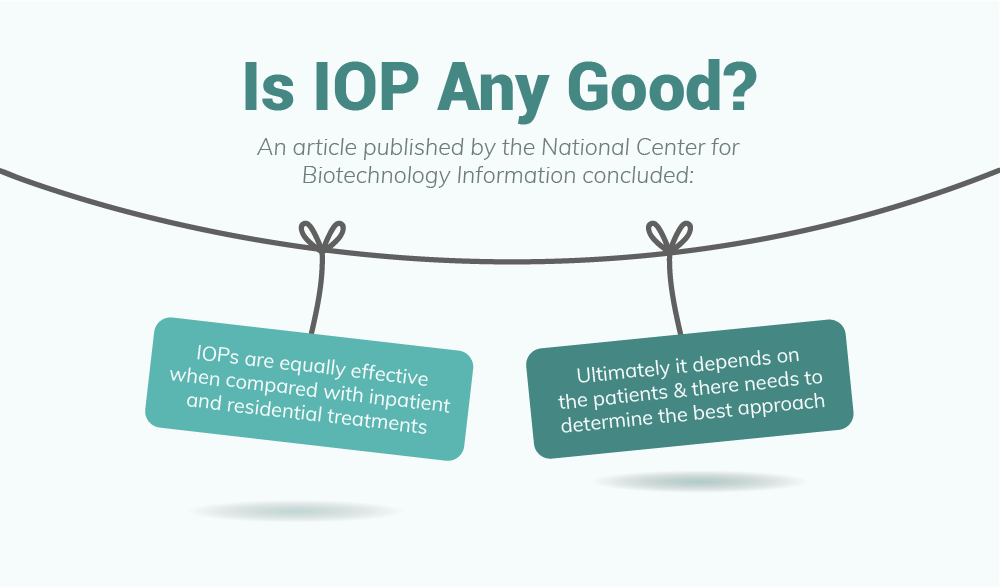
Our IOP and traditional outpatient treatment is the best in the state of Washington. We work hard every day to ensure that it is. But, plain and simply, IOP isn't the best path for everybody to recover. If you want more information on your options, contact us directly, or you can check out our pages on local drug and alcohol rehab.
At Northpoint Seattle, we want you to succeed in your addiction recovery. Our Intensive Outpatient Programs gives you the best up-to-date treatment in a welcoming environment. We can help you figure out what the right program is and verify your insurance so you know how much it will cost you. Call us today, we’re here to help.

Our admissions coordinators are here to help you get started with treatment the right way. They'll verify your health insurance, help set up travel arrangements, and make sure your transition into treatment is smooth and hassle-free.
[DirectNumber] Contact Us